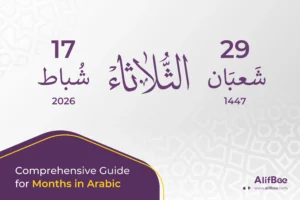How to Say Although in Arabic
Welcome to another Everyday Arabic post. The word “although” in English introduces an idea or action that happens despite another action. Today, we will explore four ways to say ‘although’ in Arabic.
Like the English word “although,” there are useful Arabic phrases that help express contrast or exception.
Phrase 1: ...مع أنّ … إلّا أنّ
Although … still …
maʿ ann ... ʾillā ann
The expression “…مع أن… إلّا أن ” (pronounced maʿ ann … ʾillā ann) is a commonly used Arabic phrase that translates to “Although… still…” or “Even though… yet…” in English. This construction is useful for contrasting two ideas, particularly when the first clause presents a challenge, difficulty, or unexpected circumstance, while the second clause describes an action or outcome that occurs regardless of this circumstance.
Let’s break it down:
- “مع أن”: This part introduces the first clause, similar to “although” or “even though” in English. It sets up a condition or situation that could typically lead to a different outcome.
- “إلّا أن”: This part introduces the second clause, similar to saying “still” or “yet.” It conveys that despite the situation in the first clause, something contrary to what you might expect has occurred.
Look at the following examples:
Examples
أمثلة
Although it was raining, I still went for a walk.
مع أنّها كانت تمطر، إلّا أنّي خرجت أتمشّى.
Although I was tired, I still went to the gym.
مع أنّني كنت متعبًا، إلّا أنّي ذهبت إلى صالة الألعاب الرّياضيّة.
Although the traffic was bad, I still arrived at the airport on time.
مع أن الطّريق كان مزدحمًا، إلّا أنّي وصلت إلى المطار في الوقت المحدّد.
Each example shows a situation where there is a problem or obstacle (rain, tiredness, or traffic), yet the action or outcome (going for a walk, going to the gym, or arriving at the airport on time) still takes place despite these challenges.
Phrase 2: ...صحيحٌ أنّ … لكن
It’s true … but …
ṣaḥīḥ ʾann... lakin..
The expression “صحيحٌ أنّ … لكن …” (pronounced ṣaḥīḥ ʾann… lakin…) translates to “It’s true … but …” in English. It is commonly used to acknowledge a positive or favorable aspect of something while contrasting it with a negative or less favorable aspect.
Let’s look at it closely:
- “صحيحٌ أنّ”: This phrase translates to “It’s true that” or “Indeed,” and it introduces a statement or fact that the speaker acknowledges as accurate.
- “لكن”: This word translates to “but” and introduces a contrasting point. It implies that despite the truth of the first part, there is another aspect that offers a different perspective or diminishes the initial positive impression.
Examine how this expression is used in the following sentences:
Examples
أمثلة
It's true that fast food is delicious, but it's unhealthy.
صحيح أنّ الطعّام الجاهز لذيذٌ؛ لكنّه غير صحيّ.
It's true the beach is stunning, but it's crowded.
صحيح أنّ الشّاطئ مذهل؛ لكنّه مزدحم.
It's true the hotel is luxurious, but it's overpriced.
صحيح أنّ الفندق فاخرٌ؛ لكنّه باهظ الثّمن.
These examples reflect an acknowledgment of a positive quality (delicious food, a stunning beach, or a luxurious hotel) using “صحيح أنّ.” Following this, the contrasting or negative aspect (unhealthy food, a crowded beach, or an overpriced hotel) is introduced with “لكن.”
Phrase 3: ...ورغم ذلك
..Yet …
wa raġm dhālik
The expression “ورغم ذلك” (pronounced wa raġm dhālik) translates to “Yet” or “Despite that” in English. This phrase introduces a contrast between two clauses, where the first clause presents a challenging or unfavorable situation, and the second clause describes an action or result that occurs in defiance of that situation.
Examples
أمثلة
He was sick. Yet he went to school.
كان مريضًا ورغم ذلك ذهب إلى المدرسة.
She was busy. Yet she found time to call her friend.
كانت مشغولةً ورغم ذلك وجدت الوقت للاتّصال بصديقتها.
She was tired. Yet she finished the project on time.
كانت متعبةً ورغم ذلك أنهت المشروع في الوقت المحدّد.
Notice how each example starts with a challenging situation (being sick, being busy, or being tired) and then introduces the surprising or contrasting action (going to school, finding time to call a friend, or finishing a project on time) using “ورغم ذلك.”
Phrase 4: … ومع ذلك …
… Nonetheless …
wa maʿa dhālik
The expression “… ومع ذلك …” (pronounced wa maʿa dhālik) translates to “Nonetheless” or “Even so” in English. It introduces a contrasting action or outcome that occurs despite a negative or challenging condition mentioned in the previous clause. This phrase highlights resilience, persistence, or an unexpected result, much like “Yet” or “However.”
Examples
أمثلة
The book was boring; nonetheless, I finished reading it.
كان الكتاب مملًا؛ ومع ذلك أنهيت قراءته.
The test was difficult; nonetheless, I passed.
كان الاختبار صعبًا؛ ومع ذلك نجحت.
The noise was loud; nonetheless, she was able to sleep.
كان الضّجيج عاليًا؛ ومع ذلك كانت قادرة على النّوم.
The examples illustrate the use of this expression in different contexts. Each example begins with a challenging or negative situation (a boring book, a difficult test, or loud noise) followed by a contrasting action or outcome (finishing reading the book, passing the test, or being able to sleep) using “ومع ذلك.”
More Examples
So, these were four ways in Arabic to show contrast similar to the expression “Although” in English. Now, let’s see them in a larger context by looking at this real-life situation:
Ahmed and his family visited a popular tourist destination during a family vacation. They encountered various challenges during their trip but still had a great time.
Although .. Still
مع أنّ .. إلا أنّ
مع أن زخات المطر العرضيّة كانت غير متوقّعة ، إلا أنّهم تمكّنوا من استكشاف المعالم المحلية واستمتعوا بوقتهم في الهواء الطلق
Although the weather was unpredictable, with occasional rain showers, they still managed to explore the local attractions and enjoyed their time outdoors.
It's true
صحيح أنّ .. لكن
صحيح أن الطّعام في المطاعم المحليّة كان باهظ الثمن، لكنّهم تمكنوا من العثور على بعض بائعي الطّعام في الشّوارع بأسعار معقولة وأطباق لذيذة.
It's true that the food at the local restaurants was quite expensive, but they managed to find some affordable street food vendors with delicious dishes.
Yet
ورغم ذلك
كانت شقيقة أحمد الصّغيرة تشعر بتوعّك خلال الرّحلة. ورغم ذلك تمكّنت من المشاركة في معظم الأنشطة مع عائلتها واستمتعت.
Ahmed's younger sister was feeling unwell during the trip. Yet, she managed to participate in most of the activities with her family and had fun.
Nonetheless
ومع ذلك
لم يكن الفندق الذي أقاموا فيه فاخرًا كما كانوا يأملون؛ ومع ذلك كان الموظفون ودودين وكان الموقع مثاليًا، مما جعل إقامتهم ممتعة.
The hotel they stayed at wasn't as luxurious as they had hoped; nonetheless, the staff were friendly, and the location was perfect, which made their stay enjoyable.
Final word
We hope you found this blog post helpful and informative. By practicing these expressions, you can express contrast and exception more accurately and naturally in your Arabic conversations.
Keep practicing and expanding your vocabulary, and don’t forget to check back for more Arabic language tips and insights.
See you soon!








